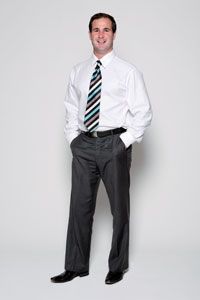Franchising 101
How has the franchise business model coped with the economic meltdown?
Patricia Moore gets the lowdown from leading franchise consultants and showcases four innovative new franchise businesses
|
Franchising in The result is that franchisees frequently end up not getting the advice they should. “They enter into deals but wake up once the honeymoon’s over, suddenly realising what they’ve got into.” Learmonth would like to see leadership from government. “There’s concern about people putting money into finance companies and rest homes and property – why should investing in franchises be any different?” (The introduction of franchise specific law is currently being debated with some supporting the current system of self-regulation and others in favour of following The franchise sector is substantially larger than many people realise, says Graham Billings, GM of the Franchise Association of New Zealand (FANZ). Current estimates suggest turnover of between $15 billion and $20 billion, representing between eight percent and ten percent of GDP. Around 350 franchise systems currently operate here – roughly 75 percent of which are home-grown. And, with approximately 14,000 franchisees employing something like 100,000 people, franchising has obviously found favour with Kiwis who want to be their own boss. Indeed, as the number of redundancies grows and more people feel the chill winds of looming unemployment, being your own boss does begin to sound like a great option. Adam Dunkerley, of franchised computer repair specialists Need A Nerd, reports ‘huge interest’ over the past few months. “Where we’d be talking to two or three potential franchisees, now it’s closer to 20.” Approximately ten percent of those enquiries have come from someone in a redundancy situation, he says. Another upside of the current recession is the growing volume of work, he says. “Customers are repairing computers rather than replacing them.” Franchisors are currently getting enquiries from good quality people, says Simon Lord, publisher of Franchise New But uncertainty about economic prospects and the availability of finance can be sticking points, says Lord. “While the banks will still fund a good business proposition which has adequate security, a lot of people are highly geared and that reduces the level of security.” “The funders who really understand the business model will still be able to assist,” says Daniel Cloete, Westpac’s national franchising manager. “This is one of the strengths of franchising – comparing results and projections and getting to a much more informed position before deciding, thereby lowering risk.” But times are tough. Is franchising the answer? Starting a business from scratch carries more of a risk, says Win Robinson of Franchize Consultants. “Buying into a proven business format and a success history can be a wiser thing to do.” However he says, there’s still some risk in that the franchise type of business may not be suited to the individual. “It’s essential that the franchisor puts considerable effort into working out a franchisee profile.” The current business environment could open opportunities for new franchise systems from sectors serviced by fragmented operators struggling on their own – this according to James Phillips, franchising manager for ASB Business Banking. “Existing operators simply convert to the new system, and don’t have to carry the full capital costs of equipment, stock and fit-out.” For buyers after a business that’s been proved to work – and comes with step-by-step instructions covering almost every possible contingency – a franchise could well be the answer. However, if you’re the entrepreneurial type, chances are the franchise business model won’t suit you; a franchisee must stick to the systems in place – changing the rules just isn’t an option. Do your homework The key to any successful venture, be it scaling a mountain or building a business, is doing your homework. There’s a huge amount of information and professional advice available to both potential franchisors and franchisees (Google ‘franchise’ and you’ll get around 18 million results). The good stuff all says the same thing; get professional advice. And that doesn’t mean the family lawyer or a mate who ‘does the books’. Talk to the franchise experts – legal, accounting and finance professionals who understand franchising. They may not be able to build a burger or look happy behind a lawnmower, but they know what’s what when it comes to contracts and dollars. And if they’re asking the hard questions, remember, that’s what you’re paying them for. “There are some great franchise opportunities out there, and some that may be not so great,” says James Phillips. “Like any business decision people need to do their homework, check things out and involve their professional advisers in the due diligence.” He says franchise purchasers also need to look at their own skill base and be clear on what they are bringing to the table, what is required to achieve success, and exactly what the franchisor is offering, so that there are no surprises along the way. “People need to get smarter in selecting an industry or business they can really get involved in,” says Robinson. “They need to do their due diligence to confirm that what they are looking at is suitable for them and that the network performs to the satisfaction of the franchisees.” New franchises are starting up all the time, says Viv Vesty, senior manager franchising and professional business at the National Bank. “Except for last year, we’ve seen franchising, as an industry, grow by about 15 to 20 percent over the last five years.” If the concept is brand new, the risk is high, she says, with the cost of getting started a barrier for many. Taking into account feasibility studies, registration of intellectual property and manuals, disclosure documents and drawing up franchise agreements, it can run to around $80,000, she says. “Running a franchise system means asking people to invest in your business; you have a duty of care to ensure it is a robust, profitable and proven system from the outset.” There’s a degree of naivety around how easy it is to set up a franchise, says Patrick Learmonth. “There’s a lot more involved than people appreciate and there’s certainly no fast buck in it. It requires a lot of hard work and a lot of investment.” Being a franchisor also requires a different set of business skills. “It’s one thing to set up a business and run that successfully and maybe have a second outlet somewhere. Managing a whole chain of individual owners requires quite different skills.” Is now good? Given the state of the economy and the bleak prospects for many businesses, is the time right to be launching a new franchise? Patrick Learmonth: “If you want to start a new franchise system you’re going to have to work very, very hard and you’re going to have to come up with a proposition that really does work, where cashflow is clear and funding is not a problem. There are some great deals in terms of leasing and the assets needed to run a business, but boy, you’d better have a good business proposition.” Westpac’s Cloete also sees some positives in the current economic climate. “Rents may be more reasonable, good sites are becoming available, landlords may be prepared to make fit-out contributions, and less competition and initial rental-free periods can assist new businesses.” Good staff may also be easier to find, he says. Naivety is not limited to wannabe franchisors. Too many potential franchisees let their hearts rule their heads, either by getting into a franchise system because they like the product or by ignoring available advice. “Some people wear hugely rose-coloured glasses,” says Graham Billings. “There are two issues they need to understand. One is why they want to get into franchising and which one to choose – the other is that it’s their business, they have to drive it.” The transition for franchisees, who have probably always been in the corporate world, and had a manager to whom they could pass the buck, can be difficult, he says. |
So will those rose-tinted spectacles see franchisees falling by the wayside? Billings recently attended the Victorian State franchising conference where one of the speakers drew a parallel between Darwin’s theory of survival of the fittest and the Darwin awards – the posthumous awards given to those whose early (and usually ludicrous) exit from the gene pool actually helps us all. “Good franchise systems with the ability to adapt will get stronger. Those who do nothing and wait for things to get better will become victims.”
Franchise study #1: Dream Doors But bringing the franchise here was not simply a case of changing ‘ The pilot was an essential he says. “It ascertained the financials, showed what kind of returns could be expected, got a supply line put in place and ensured the whole system functions and works professionally and can support the franchise network as it grows.” Dream Doors is a kitchen facelift specialist. Around Wanaka, home base to the company, and the area they trialled, they sold about $400,000 worth of kitchens over that 12-month period – not bad in an area with a population of less than 5000. “It’s gone very, very well here,” says Lilly. His advice for would-be franchisees is to ensure the franchisor is a member of the Franchise Association. “Their code of ethics is superb.” A franchisor also needs to be able to demonstrate a trading history. “This is really important. Someone’s got a good idea? That’s not the same. Where’s the history? Where’s the proof? Where’s the money being made? Who’s making it? What are the percentages? It all needs to be clearly shown.” For Dream Doors, getting the right professional advice was paramount as they adapted the business model to the Franchise study #2: SBA Buying a franchise is the ideal solution for someone who knows the knitting but lacks the pattern, explains Lisa Holten. “Systems are set up and ready to go. You don’t have to reinvent the wheel – it’s tried and tested and it works. And you’ve got a pool of resources you can call on.” Holten, and business partner Cheryl Magon, are the Small Business Accounting (SBA) franchisees in Pukekohe. But choosing the right franchise is about a lot more than finding something you can afford. You’ve got to do the groundwork, they say. Holten and Magon have accounting backgrounds and were working together in Holten’s former enterprise, ‘doing the books’ for a number of equally small businesses, when the opportunity to become SBA franchisees came up. They liked the concept and were impressed by the systems founder Warren Mills had put in place. And the timing was right; the franchise would move the business up to the next level, offering clients a greater level of service and a wider range of products. With the sale of SBA to Adam Parore and SallyRidge in 2007, that range of products has increased even further. “He’s given us ‘fries with that?’ opportunities and challenged us. The systems haven’t changed but there are more revenue streams available – mortgages, insurance, KiwiSaver,” says Holten. Five years on the business has grown and the client base broadened. Last year they won SBA’s ‘most improved’ award. But there’s nothing formulaic about their approach. “Our personal touch is the point of difference,” says Magon. “Clients appreciate that.” Franchise study #3: SKIDS Dawn Engelbrecht and business partner Bev Parsons were Safe Kids in Daily Supervision (SKIDS) franchisees who liked the business so much they bought the company. “We then spent our first year restructuring from the ground up.” says Engelbrecht. “We looked at absolutely everything we did, more often than not from the franchisee perspective. Was it adding value for them or was it just a piece of paper?” SKIDS programmes are carried out in schools, before and after classes. But they’re not just about supervising homework; new resources are constantly being developed and these are trialled at one or two sites before being rolled out to the group. Currently 28 franchises operate in 48 schools throughout the country. ‘Head office’ runs eight of them. “We quite simply haven’t found the right person for those sites,” says Engelbrecht. The right person is one who’s passionate about children, she says. “If they come in for that first interview and all I hear is money, they don’t make it to the second. It’s as simple as that. They’ve also got to be able to follow systems. But we don’t want yes-men! If no-one challenges the way you do things you could be doing something wrong forever and never know.” A year ago Wayne Johnson bought a SKIDS franchise. And he hasn’t looked back. He’s grown his programme from an average of 17 a week to 45. “And it’s still growing.” Johnson wanted to eventually own his own business, so after two redundancies in five years he decided to act. “Why SKIDS? I’ve always loved dealing with children and I’m a bit of a kid myself really.” The support a franchisee receives is great, especially if you’ve never owned a business before, he says. “In the beginning they literally hold your hand through every step.” It’s also a great lifestyle choice, says Johnson. “The hours mean I have time to concentrate on marketing and admin – or the gym and golf on quiet days. Finally I can say I love my job!” Franchise study #4: Graffiti Doctor When Napier-based pest control specialist Darryl Knauf was looking for something to supplement his income over the winter months, he put his knowledge of chemicals to good use – and came up with a radically new way of removing graffiti. Local businessman Steve Trott saw it had potential for franchising, and the Graffiti Doctor partnership was born. But getting to the stage where they had a system to sell took an enormous amount of work, says Trott. The set-up cost can be very expensive, he says, although his business background and Knauf’s operational experience were definite advantages. Knauff trialled a wide range of products for around 18 months before settling on a range, most of which are used exclusively in The first franchise went ‘live’ in December last year and there are currently four franchises operating, plus HawkesBay. Discussions are underway with several others and they’re aiming for 32 – roughly a third will be in the area from The interest is definitely there, says Steve Trott. “We’re already working with City Councils which recognise the benefits of the system, and as that snowballs and we get more on board it becomes easier to convince franchisees the work is there, which will make it easier for them to arrange funding.” Patricia Moore is an Auckland-based freelance writer. Email [email protected] Useful websites: www.franchise.co.nz www.franchiseassociation.org.nz www.franchize.co.nz www.kensingtonswan.com www.dreamdoors.co.nz www.sba.co.nz www.skids.co.nz www.graffitidoctor.co.nz www.franchisebusiness.co.nz (ASB)
|






